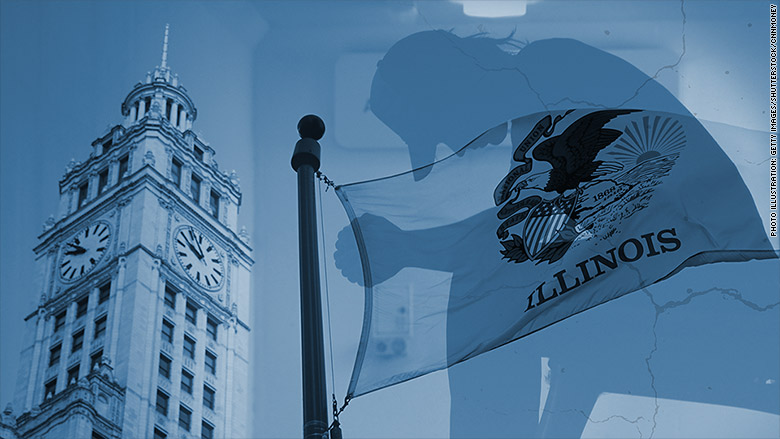
Ricky has a history of pulling knives, starting fires and hearing voices. Just last month the Illinois teenager tried to take his own life.
Now a budget crisis in that state is threatening to cut off the critical treatment that Ricky and other troubled teens receive at a highly specialized residential facility in Missouri because Illinois hasn't paid for the grant that supports their care.
Ricky and five other youths are set to be prematurely discharged in early August from the facility, which is called Calo. Moving them out could disrupt their recovery, or even put them at risk of hurting themselves or others.
"Kids like Ricky, left untreated, will end up in jail, often leaving a trail of destruction behind them," said Ricky's father, Louis, who also has a 2-year-old son at his home in Moline, Illinois, whose safety he worries about.
CNNMoney is withholding Ricky and Louis' real names to protect the identity of the minor.
Ricky was adopted out of the Utah foster care system in 2007. He has been diagnosed with reactive attachment disorder, which often manifests as bipolar disorder and schizophrenia. He has been hospitalized many times over the years.
Calo, where Ricky arrived in March, focuses on helping emotionally wounded teens with childhood trauma learn how to build relationships. Louis said the treatment seems to be helping stabilize his son, though there have been setbacks.
But this specialized care is unlikely to be replicated at other facilities in the region, some of which have been shuttered by the budget crisis.

Related: Illinois avoids downgrade to 'junk' -- for now
Moving a teen with Ricky's disorder from this facility would be "problematic," said Julie Beem, executive director of the Attachment & Trauma Network, a parent-led organization supporting families of traumatized children.
Beem, who is not familiar with Ricky's case, said people with the disorder are vulnerable to changes in their environments.
Louis and the other parents have reached out to lawmakers and state agencies to try to fix the billing problem before a potentially disastrous discharge. Progress has been made in recent days, but it's unclear whether the matter will be settled before the deadline of August 5 or 6.
"The families are trying to prevent their kids from being incarcerated or hurting other people," Louis said in an interview.
'That's the human toll'
Illinois racked up a stunning $15 billion of unpaid bills during a two-year budget standoff that ended last week. While a budget compromise allows Illinois to borrow $6 billion to pay some of those bills, not all will be paid right away.
About 80,000 people in Illinois have lost access to mental health care because of the budget crisis, according to a recent survey by the Community Behavioral Healthcare Association of Illinois, which represents mental health, substance abuse and youth service providers.
Roughly two-thirds of the not-for-profit mental health and substance abuse agencies in Illinois have reduced or eliminated programs or services, the survey found.
"Our industry has been severely impacted," said Marvin Lindsey, the association's chief executive.
Lindsey told the story of an Illinois mother whose son was turned away by an addiction clinic with a waiting list. She returned a few days later and told the clinic to take her son's name off the list because he had overdosed and died.
"That's the human toll," said Lindsey.
While Lindsey applauded the budget deal because it "stops the bleeding," he warned that rebuilding will take time. "It's not going to be business as usual," he said.
Related: How Illinois became America's most messed-up state
From 'godsend' to nightmare
One of the programs disrupted by the Illinois budget mess is the Individual Care Grant, which allowed Ricky to be treated by Calo and another facility that has since closed. Louis called the Illinois grant, which is administered by the Illinois Department of Healthcare and Family Services, a "godsend."
But Calo told CNNMoney it hasn't been paid by the state for the services it has provided for Ricky, four other Illinois teens and two preteens. The state is required to pay much of the cost of each patient's treatment, totaling nearly $400 per day.
"We know that families have been facing very real difficulties during the budget crisis, and we continue to work closely with medical providers to try to ensure that crucial health care is available," said John Hoffman, a spokesman for the Department of Healthcare and Family Services.
Hoffman said the state is processing payments for the grant program that Ricky uses on a "timely basis" to the state's comptroller, where they "await available cash for payment."
CEO: We can't 'trust' Illinois
Calo said it faces a year-end hit of at least $700,000 if it doesn't either get paid by Illinois or discharge these patients.
"We cannot really trust our relationship with the state of Illinois," said Calo CEO Chris Perkins.
The good news is that in recent days Perkins said he's made "traction" with Illinois officials. He hopes to be able to rescind the discharge notice if he has reason to believe Illinois will pay.
"Our ultimate goal here is to come to an amicable solution," Perkins said.
In the meantime, Louis and other parents are praying that their children won't become the latest victims in the state's financial mess.
"The budget issues are directly affecting the most vulnerable among us," he said. "They're getting marginalized by the very system that's supposed to be helping them."


